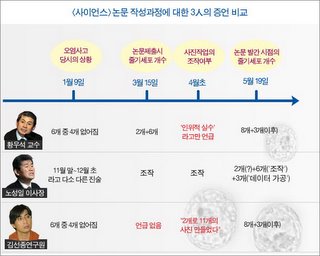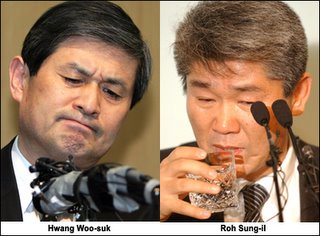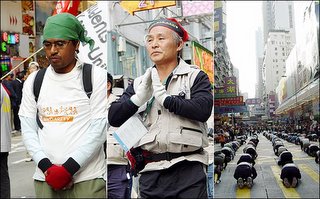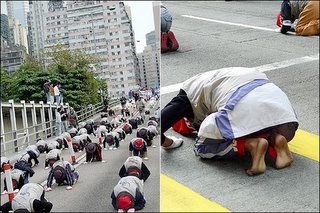The Way We Were
since 2005
Friday, December 16, 2005
A View
Trying to stem controversy in South Korea
By TOM PLATE
LOS ANGELES -- The people of South Korea have responded to the stem-cell scandal involving genius-innovator Hwang Woo Suk with admittedly excessive passion and near-unanimous conviction. Still, by rallying around their amazing Seoul National University pioneer, their support should be a comfort to risk-taking scientists all over the world. Safe science is not always the best science. This is especially the case with technically tricky and sometimes ethically complex work, such as stem-cell research. It's true that at the end of the day the benefits of the research may prove disappointing. But you don't know until you find out. Hwang is obviously for trying to find out: No guts, no paradigm shift, no glory.
This South Korean veterinarian astonished the world in 2004 when his Seoul laboratory produced the first cloned embryonic stem cells from adult human patients. Hwang and his team at Seoul National University led a global pack of scientists in search of ways of approaching crushing human diseases such as Parkinson's. Time magazine took note of Hwang's cloning of the world's first dog, "Snuppy," by naming it invention of the year.
But at the same time questions were being whispered throughout the global scientific world as to how readily and rapidly the lab had managed to come into possession of the many fresh human eggs needed for the experiment. Eventually, the mounting suspicion crashed into scandal: A South Korean news program, in a documentary, provided evidence that two female junior staffers had been clandestine donors of a large number of (generally hard to find) fresh eggs to fuel his work. The story made headlines around the world: The professor had to admit to having crossed an ethical line and stepped down as head of the World Stem Cell Hub in Seoul.
Even so, the pioneer's South Korean countrymen are standing behind him. What's notable is that such a high level of public support for stem-cell science occurs in a society drenched in religious values -- as is America, where, by contrast, this research has been plagued by political opposition from the right. But South Koreans appear to accept that serious -- and sometimes risk-taking -- science has a solid track record of defeating or ameliorating terrible diseases from the simplest infection to the complexities of polio or AIDS.
What's more, South Koreans are driven by the norms of patriarchy in ways that we in the West do not. Were these two junior female researchers truly coerced into donating their eggs, or were they simply dedicated and high-minded junior scientists who wished to help to their pioneering professor to the extent they could?
And finally, there's the issue of national pride. To have in their midst a scientist of the stature of the path-finding Hwang is more important to South Korea than outsiders might imagine. Until relatively recently, South Korea has been a sort of lost country, in the shadow of the (former) Soviet Union, China and Japan. But since the late '80s, South Koreans have been clawing their way to the top tier of world economies, astonishing everyone with their penchant for innovation, democracy and solid diplomacy.
However, South Koreans need to balance their emotional support for Hwang with more respect for the role of the news media. The TV program and network in South Korea that broke the Hwang story with an hourlong documentary about the suspicious source of the egg donations have been demonstrated against and denounced. This blame-the-messenger public fury is unfortunate. The president of South Korea, Roh Moo Hyun, has rightly come to the new program's defense. Moreover, while announcing its continuing support for Hwang's work, the South Korea's political establishment has wisely created a new ethics committee to shed light on the many penumbrae of biotechnology.
At the same time, this scandal does provide South Korea's news media with an opportunity to examine itself. The trickiest of ethical dilemmas requires a sensitive balance of reason and judgment to assess. Sometimes these issues are too complex to be handled in the raucous news media, which perforce must simplify and over-dramatize in order to communicate to the masses. The controversy about pioneer Hwang may go down in history as just such a classic case for journalists as well as scientists.
UCLA professor Tom Plate is a member of the Pacific Council on International Policy
Copyright 2005 Tom Plate
Times Online Q&A
 Times Online December 16, 2005
Times Online December 16, 2005 Q&A: human cloning controversy
 Mark Henderson, science correspondent for The Times (left), analyses the controversy around Dr Hwang Woo-suk, a pioneer of stem cell research, who today admitted making mistakes in his research
Mark Henderson, science correspondent for The Times (left), analyses the controversy around Dr Hwang Woo-suk, a pioneer of stem cell research, who today admitted making mistakes in his researchWho is Dr Hwang Woo-suk?
Before the current controversy erupted over his work, Hwang was widely seen as the world's foremost pioneer of human therapeutic cloning.
In February 2004, his team published the details of the first cloned human embryo, beating rivals in the US and the UK, and he appeared to have topped that achievement with his now disputed Science paper of May this year.
In that research, Hwang purported to have created 11 "lines" or colonies of embryonic stem (ES) cells from clones of real patients with diseases such as Parkinson's and diabetes.
The achievement was widely acclaimed as critical to the future of this technology - these ES cells would be genetically identical to the patients, and could thus potentially be transplanted without fear of rejection to treat their conditions. The work also had important implications for research, as it would allow the production of stem cells that accurately model genetic diseases.
What has he admitted to today?
Not very much. He has admitted that some of the photographs of the 11 lines he submitted to Science were duplicates, so that images of all 11 did not appear in the paper. He has also said that six of the 11 lines have now died, because of a fungal infection, and that they are not therefore now available to independent researchers to check.
Hwang, however, rejected allegations from his colleague Roh Sung Il that he had actively fabricated data to make it look as if he had made more ES cell lines than was actually the case. Roh has charged that nine of the lines were essentially fictional, and that even the other two have yet to have their authenticity verified.
Hwang has also told the journal Science, which published the work, that he wishes to retract it. Science will agree to this only if all the co-authors concur, or if its own investigations reveal fatal flaws in the research.
How serious are the errors he says he has made?
The duplication of photographs is an important matter, as it gave a misleading impression about the number of stem cell lines that had been shown to be created. However, on its own, this does not invalidate the work and it may well have been an honest mistake. Most independent experts think it strange that Hwang should want to withdraw the paper purely because of this mistake.
More serious is the charge that the DNA profiles of the ES cell lines do not actually match those of the patients from which they are supposed to have been cloned. If this is proven, it would mean that he had not in fact produced true clones, and might even be guilty of outright scientific fraud.
Another problem would emerge if Dr Roh is right, and none of the 11 lines still exists in a form that allows independent scientists to test them. This week, a group of experts led by Ian Wilmut, the creator of Dolly the sheep, suggested that Hwang submit the cells for independent tests to verify his claims, but if he is unable to do this it would be difficult for him to clear his name.
Will this cast doubt over his other research? What about Snuppy?
No evidence has emerged to date that casts doubt on his 2004 human clone or the creation of Snuppy, the first cloned dog, which Hwang announced earlier this year. If he is proved to have fabricated data, however, scientists will start to question his other research too. Many will feel that if he has cheated once, he may have done so on other occasions as well.
How bad a setback is this for stem cell research as a whole?
It is something of a disaster. Religious groups who oppose therapeutic cloning and the use of embryonic stem cells have already seized on Hwang's troubles to accuse the entire field of being founded on hype and not science.
Scientists reject this, but they are worried about the effect on public opinion. Many feel that the problems make it all the more important that countries like Britain and the US support cloning and ES research enthusiastically, so that they can control the scientific and ethical parameters in which it is attempted.
Australian PM to Receive Stem Cell Report
Australian PM to Receive Stem Cell ReportAccording to the Victoria Herald-Sun, a report to be given to Prime Minister John Howard next week is expected to call for relaxing the current Australian restrictions on embryonic stem cell research. The report will recommend allowing SCNT, or therapeutic cloning, while still banning reproductive cloning. Scientist would be legally able to create embryonic stem cells, rather than relying on donated embryos left over from in-vitro fertilization procedures.Let’s see what happens.
Mea Culpas: The real cure for any bias we have?
Victory for the Korean journalism? The storybook of Dr. Hwang's research scandal seem to have come near to its final chapter. But the Korean journalism is dead.
The Korean journalism, ignoring the mirror reflections of themselves, agonizes over the nation's "hero-making" mentality , criticizing this awefully odd national sentiment we have but which others from out of town seem to never understand to the heart and soul. At the center of most of this unique boosterism, either pro- or anti-what-so-ever, lies the very questionable ethics of Korean "professional" journalism. Hit and run, stir and apology, the name of the game they are supposed to play. Or is it all indicating they're in the transitional phase from pseudo-journalism to the "real" one, if real is any proper word to modify them. It's all right that they don't have such a mentality as we have, but one thing I can say for sure is they DO have this strangely distorted tendency to slant the news to the one extreme, left or right, liberal or conservative.
As the battles they waged are closing now, who are the winners, with all of us left to be losers, deeply wounded in both body and soul?
*** After all, the stem cell paper published in the journal Science has turned out to be fabricated, but this is a fact, though miserable, but the question of the truth still remains to bother us, which is by whom and why...




